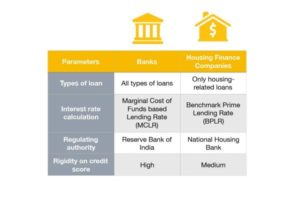Last week, we curated a list of home loan interest rates offered by various banks and housing finance companies. A reader commented on the post, “I want to take a home loan. Should I go for a traditional bank or the housing finance company?” So, here we are with our next post analysing which financial instrument is better for availing a home loan.
The classic definition
Let’s begin with the classic definition. A bank is a financial institution licensed to receive deposits and give loans. While a Housing Finance Company or HFC is a company registered under the Companies Act, 1956, which is involved only in providing housing-related loans. These include home loan, loan against property, construction loan, etc.
Regularisation
Both banks and housing finance companies are regulated but by different authorities. All banks are governed by the Reserve Bank of India (RBI) while HFCs are governed by the National Housing Bank (NHB).
Source of funds
Banks lend loans by using the money deposited in Current and Savings Account (CASA) by the customers. While HFCs usually raise funds from the public or by borrowing from banks. Since the money is borrowed from banks, the home loan interest rates are higher for HFCs.
Interest rate
The housing finance companies follow a Benchmark Prime Lending Rate (BPLR). While the banks offer interest rates based on the Marginal Cost of Funds based Lending Rate (MCLR). Interestingly, banks cannot lend at below the MCLR. However, for HFCs, there are no such restrictions, which gives freedom to increase or decrease the interest rates as per their requirements.
This also means that “HFCs are slow to pass on interest rate benefits to borrowers simply because their interest rates are fixed on their average cost of funds since they follow the BPLR model. Banks follow the MCLR model, which is governed by the RBI and ensures that rate cuts are passed on to customers quickly,” informs Anuj Puri, Chairman – ANAROCK Property Consultants.
The process
Banks are stricter when it comes to the home loan sanctioning process with lengthy paperwork. However, HFCs require less paperwork and formalities. However, it has been observed that the latter increase the interest rate if your credit score is poor.
The difference in the loan amount
Unlike older days, HFCs can no longer offer a higher loan amount than banks. Before 2015, HFCs used to include stamp duty and registration charges in their loan amount while banks used to consider the property value. In 2015, NHB released a circular stating that HFCs should not include these charges for properties priced over Rs 10 Lakh.
The million-dollar question: what is better?
Well, it is not easy to declare an outright winner among the two options. “Earlier, the steep interest rates of HFCs gave banks an edge. However, now there is a parity between the two as most HFCs offer loans at rates within 8.6-11.2%, while banks offer loans at 8.3-10.5%. The gap has significantly reduced,” says Anuj.

Banks vs HFCs
Having said that, both financial institutions have their advantages and disadvantages. Experts opine that the decision to opt for a lender should be based on the financial health of the lender.










